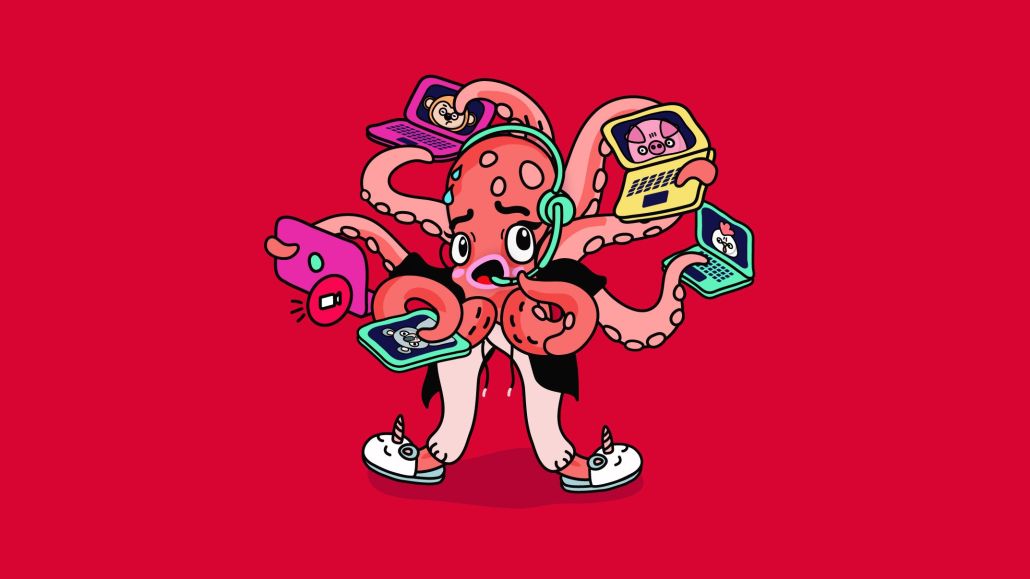Save 50% on a 3-month Digiday+ membership. Ends Dec 5.
The Job Juggle: Gen Z and millennial employees embrace the concept of ‘Polywork’

Being tied down is so pre-pandemic.
Take Cassidy Williams, a Chicagoan who works as a software engineer. She’s also an advisor, investor, mentor, writer, public speaker and podcast host.
“Work is something that takes up such a huge part of my life, so doing different types of work keeps it more interesting and exciting,” she said. “People have the ability now more than ever to collaborate, create and just do things that don’t fall into one bucket. We’re past the age of being just one type of worker.”
Then there’s Richard Fearn, based in London, who runs a nonprofit, manages investments — and is in the middle of producing a musical. “I’ve never liked the idea of just doing the same thing every day,” he said. “I have multiple interests that I’m passionate about and they’ve naturally become different streams of income for me. Modern working attitudes and flexible technology allows my generation to juggle a multitude of things in a way we’ve never been able to before.”
The professional workforce, particularly millennials (aged between 25 and 40 years old) and Gen Z (up to 24 years old), is increasingly rejecting the concept of a full-time job and a single boss in favor of something that’s being dubbed “polywork,” or having multiple jobs at once.
A study of this blooming workforce by a new social network, also called Polywork, found that 55% of the 1,000 workers it polled, aged 21 to 40 years old, said an exciting professional life was more important than money. Just 35% said they could envision sticking with a single job for life, while nearly 64% said they already were doing more than one job or hoped to in the future. More than 70% of those surveyed believe the pandemic accelerated the trend.
The rise of polywork dovetails with the much-documented decline in job satisfaction amid the pandemic, which left employees feeling undervalued, as well as lacking communication and a connection to their bosses. In a recent survey, Skynova, a small business support firm, just 53% of employees said they were given goals directly related to the quality of their work, while 45% of employers rewarded workers who exceed performance standards.
Ad position: web_incontent_pos1
As for the site Polywork, it lets users create a free personal webpage, share what they’re up to personally and professionally, and send collaboration requests to other members. Its backers include a who’s who of Silicon Valley, including Ray Tonsing (early investor in Clubhouse, Airtable and Brex), YouTube co-founder Steve Chen, Twitch co-founder Kevin Lin, PayPal co-founder Max Levchin, VSCO co-founder Joel Flory, Behance founder Scott Belsky and Worklife Ventures founder Brianne Kimmel.
“The data from our community shows that there will no longer be such a thing as a single job for life and that people are rejecting the single job titles that have been bestowed upon them for the last 10 years in favor of representing all the different types of things they do, and working in multiple ways at once on their own terms,” said Polywork’s founder Peter Johnston, a Belfast native and a former designer at Google and M&C Saatchi London.
While Polywork is targeted to Gen Z and millennials, it is open to those of all life and career stages, Johnston stressed. While it’s free to members, the team is working on a premium version so users can share more.
Johnston points to the dramatic power shift from boss to talent during the pandemic. “We are seeing the largest shift to entrepreneurs in history,” he said. “Think about what just happened in the world — it was such a collectively intense situation we all went through. I don’t know if there could be a bigger kick in the butt [to inspire people] to do what they want to do. You can become a full-time writer or start a business.”
That desire to live a multifaceted professional life must be understood and supported by employers, as Johnston sees it. “If businesses do not listen to their talent, we will see those companies start to become dinosaurs,” he said.
Ad position: web_incontent_pos2
San Francisco-based Idan Gazit, director of research, future projects at the software developer GitHub, who has also advised on Polywork, said: “If you look at a lot of job descriptions, they are one-dimensional: write code and more code. Where can you find people and opportunities to write code but also grow professionally, be given responsibility for outcomes? That’s what professional growth is.”
Millennials like himself often don’t see themselves portrayed as who they really are, Gazit related, and like so many professionals of all generations, it’s easy to feel pigeonholed — something the social network aims to change. “People are saying, I want something where the product understands I do a lot of different things and derive value from those different things,” he said. “Now you can define yourself how you want.”
More in Marketing

Ulta, Best Buy and Adidas dominate AI holiday shopping mentions
The brands that are seeing the biggest boost from this shift in consumer behavior are some of the biggest retailers.

U.K. retailer Boots leads brand efforts to invest in ad creative’s data layer
For media dollars to make an impact, brands need ad creative that actually hits. More CMOs are investing in pre- and post-flight measurement.
Ad position: web_bfu



